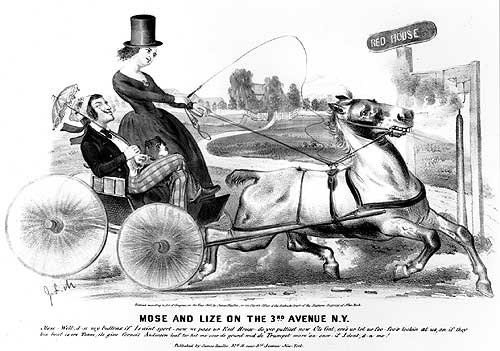 |
| Evert A. Duyckinck, letter to William Alfred Jones - July 28, 1848 From The New York Public Library Digital Collections |
Duyckinck's letter to William Alfred Jones is excerpted in Jay Leyda's Melville Log, Volume 1 [279]. Where Leyda gives the word hostage, my transcription below reads "passage"; for Dont I read "Dost"; and for Liza I have "Lize."
I was out the other day to Fort Lee with Melville—a grand picnicking day. The first lady & gentleman we came upon were in front of a table cloth spread on a rock and covered with hams, sardines &c, affectionately mouthing to each other, the Lady of Lyons. They had just reached the 'magnificent' Lake of Como passage "Dost like the picture lady?" A remark she let fall that champagne didn't inhale on an empty stomach distressed the romance or whatever it was. It was a tribute to literature notwithstanding and so was a greasy annual carried by the nymph and a clumsy octavo by another. They were of the genuine Mose and Lize school and as a philosophic gentleman we met with remarked as they roared out Negro melodies—how much better it was than fighting! --Evert A. Duyckinck, 1848 letter to William Alfred Jones; From The New York Public Library Digital CollectionsAlong with unspecified "Negro melodies," those literate lovers Herman Melville also saw and heard that summer's day at Fort Lee were enjoying this, and not as imperfectly as Jay Leyda's misread of "Dont" for Duyckinck's and Bulwer's word "Dost" might imply:
PAULINE.
I cannot forego pride when I look on thee, and think that thou lovest me. Sweet Prince, tell me again of thy palace by the Lake of Como; it is so pleasant to hear of thy splendours since thou didst swear to me that they would be desolate without Pauline; and when thou describest them, it is with a mocking lip and a noble scorn, as if custom had made thee disdain greatness.
MELNOTTE.
Nay, dearest, nay, if thou would'st have me paint
The home to which, could Love fulfil its prayers,
This hand would lead thee, listen! —a deep vale
Shut out by Alpine hills from the rude world;
Near a clear lake, margined by fruits of gold
And whispering myrtles; glassing softest skies
As cloudless, save with rare and roseate shadows,
As I would have thy fate!
PAULINE.
My own dear love!
MELNOTTE.
A palace lifting to eternal summer
Its marble walls, from out a glossy bower
Of coolest foliage musical with birds,
Whose songs should syllable thy name! At noon
We'd sit beneath the arching vines, and wonder
Why Earth could be unhappy, while the Heavens
Still left us youth and love! We'd have no friends
That were not lovers; no ambition, save
To excel them all in love; we'd read no books
That were not tales of love—that we might smile
To think how poorly eloquence of words
Translates the poetry of hearts like ours!
And when night came, amidst the breathless Heavens
We'd guess what star should be our home when love
Becomes immortal; while the perfumed light
Stole through the mists of alabaster lamps,
And every air was heavy with the sighs
Of orange groves and music from sweet lutes,
And murmurs of low fountains that gush forth
I' the midst of roses!—Dost thou like the picture?


No comments:
Post a Comment